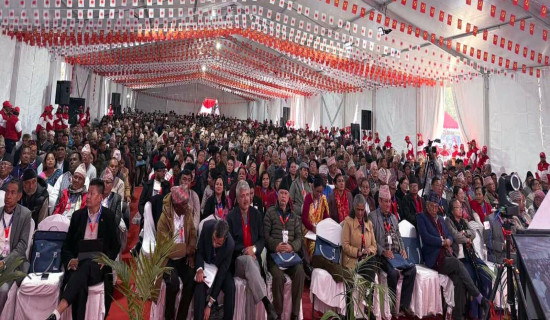- Sunday, 14 December 2025
Cultivating Change: Shekha Narayan Maharajan's Urban Green Movement
Shital Karki
 In the heart of Dallu,
a bustling neighborhood in Kathmandu, resides a visionary who has transformed
rooftops into thriving gardens and communities into self-sufficient ecosystems.
Shekha Narayan Maharajan, a name synonymous with innovation and sustainable
living, has become a beacon of inspiration for urban farmers across Nepal.
In the heart of Dallu,
a bustling neighborhood in Kathmandu, resides a visionary who has transformed
rooftops into thriving gardens and communities into self-sufficient ecosystems.
Shekha Narayan Maharajan, a name synonymous with innovation and sustainable
living, has become a beacon of inspiration for urban farmers across Nepal.
Roots of
Transformation
Shekha's journey began
humbly, as a gardener tending to the earth's bounty. Through perseverance and a
thirst for knowledge, he found himself at the crossroads of opportunity—a
training program that would change his life forever. From a gardener to this
starting point, Shekha's path unfolded, leading him to Bhutan as a waste
management and compost trainer. This was the catalyst that ignited his passion
for transforming urban spaces.
Cultivating Green
Roofs
More than two decades
ago, Shekha's pioneering spirit led him to experiment with rooftop farming at
his own home. Today, his dwelling stands as a testament to his innovation,
providing an impressive 70% of the vegetable and fruit needs for his family of
four or five. This feat isn't just about sustenance; it's about sustainability.
Shekha's rooftop garden showcases the immense potential of urban farming to
address food security and environmental challenges.
Benefits Beyond
Bounds
Shekha's work goes
beyond personal benefits. As land in urban areas becomes scarcer and pricier,
rooftop farming emerges as a viable alternative. He extols the virtues of this
practice: self-sufficiency, organic produce, low cost, fresh oxygen supply, giving
back to nature and waste management. With his guidance, communities can turn
their rooftops into green havens, contributing to healthier lives and a healthier
planet.
Innovative
Techniques for Urban Eden
Shekha doesn't just
talk the talk; he walks the walk, sharing his innovative techniques with
enthusiasm. One such method involves reuse of plastic bottles to create insect
trap by making small holes around the plastic bottles suspending aromatic
fruits like papaya, mango, pumpkin etc and placing soap water at the bottle's
base which effectively traps fruit flies, ensuring the garden thrives without
infestations.
Another amazing
innovative work on rooftop farming - creating a small field like structure on
roof without leakage clears one of the arising question; “How to do rooftop
farming without leakage problem?” He
using his innovative mind first place plastic on the floor of roof and
established a pipe drainage system which drains the water out through the holes
he made in the structure preventing leakage. Also, he did water proofing of the
roof which adds major benefit. Similarly, to prevent the load on the house he
made the mixture of cowpit, cocopit and
soil about six inch in height in the rooftop farming. “Go Green” is the motto
of his work.
He also champions
herbal solutions, concocting natural pesticides from garlic, lemon grass, basil
leaves, and a dash of soap. This holistic approach extends to recycling and
waste management, as he enlightens us on converting home waste into compost,
vermicompost and reusing plastic materials creatively. According to him,
nothing is a waste when one started doing rooftop farming.
Nurturing
Sustainability
Shekha's wisdom extends
to the very soil he cultivates. He advocates for a mix of cow-pit and soil,
promoting not only plant growth but also roof longevity. His knowledge
encompasses using cow urine as a natural alternative to conventional
fertilizers. He wants to deliver the importance of cow-pit for rooftop farming
saying, cow-pit is as light as coco-pit but using cow-pit do not require
additional nutrient supply while coco-pit do.
Yet, Shekha's most
powerful message is his unwavering belief in organic methods. He rallies
against chemical pesticides, encouraging individuals and communities to embrace
organic alternatives as he himself use no chemical fertilizers. His is a vision
where farms are vibrant, eco-friendly havens that foster harmony with nature.
Spreading Green
Dreams
Beyond his own
achievements, Shekha has empowered his community. He imparts his wisdom through
training aspiring urban farmers and spreads his green gospel. Through workshops
in schools and awareness programs across Nepal, his influence ripples far and
wide, inspiring a movement towards greener, more sustainable living.
Conclusion: A Legacy
of Growth
Shekha Narayan Maharajan's journey is a testament to the transformative power of determination, knowledge and passion. From a gardener to a rooftop farming pioneer, he has redefined what's possible in urban landscapes. His methods and ideas not only bear fruit but also inspire a profound shift towards environmentally conscious living.
(The author is pursuing an Msc in agriculture from TU)







-square-thumb.jpg)









